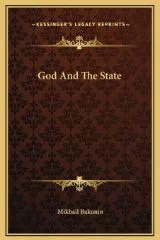On Writing by Stephen King...
Get ready to sit down with the master of horr...
By Adonis Monahan1664

0

Mikhail Bakunin is considered the godfather of the anarchist movement and his book “God and the State” lays solid foundations for the principles of communist-anarchism and anarcho-syndicalism. The book is quite disjointed as it was written in different stages and looks fragmented at a close look. You’ll see footnotes pages-long and sudden dropping out in the middle of sentences. The work done to collect the pages of the book took many years, from gathering the papers after Bakunin’s death to translating them.
His take on Marxism and his harsh critique of capitalism have been proven to be quite sharp and on-point after the Russian revolution, the Paris communes, and the Spanish collective at the beginning of the 19th century. Written in 1871, Russia, the book was intended to be a fragmented part 2 of a bigger socio-political commentary work called “The Knouto-Germanic Empire and the Social Revolution” where part 1 circles the Franco-Prussian War and the European opposition to the infamous imperialism. Bakunin’s materialist and anarchist’s viewpoints took on Christianity and technocracy to provide a well-defended view of individuality and how co-operation in a free society was superior.
Rejection of the principle of authority was a concept that eluded even Engels but Bakunin’s absolute resolve in defining the principle of authority was clear; "eminently theological, metaphysical and political idea that the masses, always incapable of governing themselves, must submit at all times to the benevolent yoke of a wisdom and a justice, which in one way or another, is imposed from above." His goal was to push self-management instead of hierarchic order. No one holds power, instead, power vanishes into the collective to translate into freedom.
Bakunin’s vocal aggression towards hierarchy and his love for freedom made him blatantly and openly reject the state, religion, capitalism, and anything the comes close to them. The divine authority had no place in his plans for a free social and equal life. Class society will remain as long as the gap of power between individuals is big, making a hierarchal and centralized structure its only means of survival.
It’s recommended to see a comprehensive collection of his work after or before reading “God and the State” that can be found in the book “Statism and Anarchy” and the “No Gods, No Masters” anthology.
Updated 4 years ago